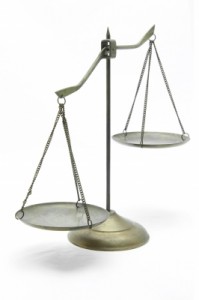This week I’m going to look at each of Looseleaf’s editorial services and tell you what they are, when you need them, and some tricks you can use to do some editing yourself before you hire it out. I’ll post about one service a day, in the order a manuscript typically undergoes them in a full publishing process. That means today is manuscript evaluation day.
What Is a Manuscript Evaluation?
 When I evaluate a manuscript, I read the whole thing in as few sittings as I can manage. This allows me to look at how the book functions as a whole: the plot arcs, the character arcs, the promises the writer made at the beginning, whether or not those promises paid off in the end, etc. I look at repetitive quirks the writing has (do you always use –ing phrases?), consistency in the dialogue, and anything else I can think of.
When I evaluate a manuscript, I read the whole thing in as few sittings as I can manage. This allows me to look at how the book functions as a whole: the plot arcs, the character arcs, the promises the writer made at the beginning, whether or not those promises paid off in the end, etc. I look at repetitive quirks the writing has (do you always use –ing phrases?), consistency in the dialogue, and anything else I can think of.
I do not edit grammar (though if there is a grammatical error the author consistently makes I’ll make a note of it), I don’t consider whether single sentences might be better placed differently, and I don’t tighten the wording. All that is for later, more fine-tuned editing. Manuscript evaluations are for grasping the big picture and making judgment calls about it.
When I’m done reading and making notes to myself, I write up a multi-paged letter (the length depends on the length and quality of the manuscript I’m evaluating) in which I discuss things that work well, things that don’t, recommendations, and cautions about where you need to be careful about the fixes you employ.
When Does a Manuscript Need an Evaluation?
There are three times when you might want a manuscript evaluation: early, late, and in a special case.
Early. If you’ve finished your manuscript and you’re about to dig in and do heavy revisions, you might want a manuscript evaluation to give you some guidance. A manuscript evaluation will point out the things you should keep and the things that need tweaking, so that editor letter can come in handy as a road map for getting started.
Late. If you’ve been querying and submitting and people are asking for your partial or full manuscript, but ultimately they’re passing, you might consider a manuscript evaluation to figure out why. Sometimes you won’t get detailed feedback from the people you’re querying; you will get it from me. This can help you hone a manuscript and get it past a brick wall.
Special Case. If you have something specific you want to do with your manuscript, but you’re not sure how, a manuscript evaluation can again give you the road map. Maybe you need to cut a substantial amount from your manuscript but you’re too close to the work to see what can and should be cut. Maybe you’re trying to popularize a scholarly work for a general audience and you’re not sure if what you’re doing is effective. Whatever the special case may be, announce that purpose in your request for a manuscript evaluation and I can focus on that purpose in your editor letter.
How Can Authors Evaluate Their Own Manuscripts?
If you’re early in your revision process, you may choose to evaluate your manuscript yourself or use free alpha or beta readers. When you’re doing evaluations, keep a few questions present in your mind:
- Who is your audience? Are you communicating to that audience?
- What insights are you communicating? Do you communicate them well?
- Does your tone change a lot over the course of the manuscript, or in unpleasantly unexpected ways?
- Are your characters flat stereotypes or fleshed-out people? Are they consistent and competent? Are their arcs believable?
- Is the dialogue didactic or stilted? Does it feel organic and unique to each character?
- If you’re writing informative nonfiction, is the takeaway explicitly linked to what you’re saying, and is it apparent what you want the reader to take away? (This is also relevant to fiction and creative nonfiction, but subtlety is more advised in those genres.)
- Are there any sentence constructions or errors that are repeatedly problematic?
- Are there any lapses in logic or plot holes?
- What is your theme? Is the theme present throughout? Is that theme useful to your target audience?
More questions will likely apply to your manuscript, and you’ll have things you want to ask yourself throughout based on your individual story or purpose. But these basics can get you started in the right direction. As always, the more objective you or your beta reader can be, the closer you’ll come to an editorial opinion.
Other Editorial Services
Image by vichie81 via FreeDigitalPhotos.net




